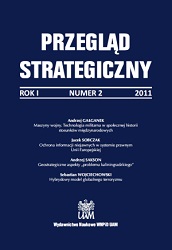EWOLUCJA POLITYKI BEZPIECZEŃSTWA JAPONII PO ZIMNEJ WOJNIE. OD „PAŃSTWA MORATORIUM” DO STRATEGICZNEJ „NORMALNOŚCI”
THE EVOLUTION OF JAPANESE SECURITY POLICY AFTER THE COLD WAR. FROM THE „MORATORIUM STATE” TO STRATEGIC „NORMALITY”
Author(s): Rafał WiśniewskiSubject(s): Security and defense, Military policy, Peace and Conflict Studies
Published by: Uniwersytet Adama Mickiewicza
Keywords: cold war; Japanese security policy
Summary/Abstract: The security policy of the Empire of Japan in the post-World War II period is a subject of lively interest among both policymakers and scholars in the field of international relations. There are two basic reasons for that. The first one comes from the traditionally important position occupied by this state in regional balance of power in Asia (which significance for the global order constantly rises). The second reason comes from a fact, that at the beginning of the cold war, Japanese leaders adapted a peculiar foreign policy and security strategy, based on disavowal of the instrument of force and limitation of the defense potential to the indispensable minimum. This policy stood in stark contrast with the common practices of the cold war international order. It was also difficult to explain from the perspective of traditional IR theory (based on political realism), which stats that the rise of state’s economic power should lead to great power aspirations and intensive arms build-up. It is intriguing, that the fundamental transformation of the international order, brought by the end of the cold war, initiated a process of change in Japanese security policy, which lead in exactly opposite direction. More unstable regional environment, changes in alliance policy and important changes in domestic political system, all determine an expansion of armed forces and widening of its mission spectrum. The nature and scope of these changes, as well as their causes and effects are extremely important for the analysis of the current and future security environment of Asia.
Journal: Przegląd Strategiczny
- Issue Year: I/2011
- Issue No: 2
- Page Range: 133-157
- Page Count: 25
- Language: Polish

